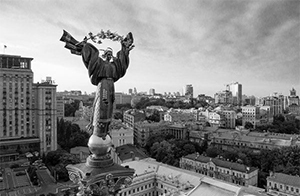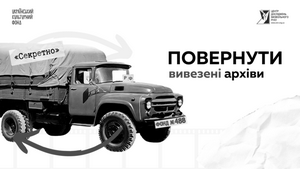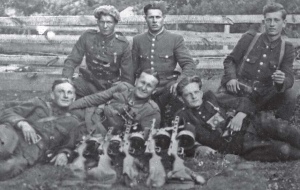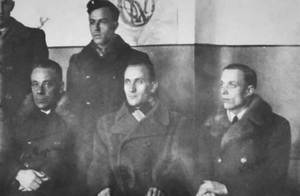Tomos-1930, or How “Ukrainian Nuncio” in Istanbul fought for autocephaly of the Ukrainian Orthodox Church
Each time imperial pressure on Ukraine got eased or formation of an independent Ukrainian state got initiated, autocephaly of the Church became one of fundamental issues. During the Ukrainian revolution, when Ukraine got independence, the issue had not been resolved. However, even upon failure of attempts at state independence, the UNR Government-in-exile kept struggling to resolve the autocephaly issue.

As the archives of the Ukrainian Intelligence Service got declassified and the information was made public, light was shed on some of the previously unknown pages of Ukrainian history. In particular, those connected with attempts of the Ukrainian Peoples’ Republic (UNR) Government-in-exile at getting Ecumenical Patriarchate’s to approve a Tomos on autocephaly of the Ukrainian Orthodox Church.
In June 1930, the Chairman of UNR Council of Ministers-in-exile Vyacheslav Prokopovych paid a visit to Istanbul. The key event of the visit was V. Prokopovych’s personal meeting with Ecumenical Patriarch of the time – Photios II. This meeting raised the issue of a Tomos on autocephaly of the UOC.
Visit arrangements and private audience of the Head of Government-in-exile with Ecumenical Patriarch were made possible due to persevering and painstaking work of UNR Government representative in Istanbul Volodymyr Mursky – his communication skills and personal abilities.
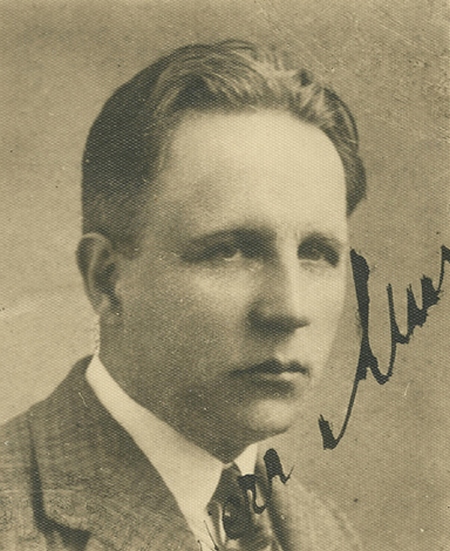 |
|
Volodymyr Mursky
|
By the way, recently, the authors of this article were fortunate enough to make a long-distance acquaintance with mister Myroslav Petriv from Canada, who is a grandson of Volodymyr Mursky’s sister – Ivanna Petriv. Thanks to the information provided by M. Petriv we found out Volodymyr Mursky to be a grandson of Mykhailo Verbytsky – composer of the National Anthem of Ukraine and a Ukrainian Greek Catholic priest.
Perhaps it was due to religious background, that Mursky grew up a true believer and had perfect understanding of the importance of religion in the struggle for independence of Ukraine.
At the same time, the Mursky family was religiously tolerant, since Volodymyr’s wife – Sophia Volska-Murska – was a catholic.
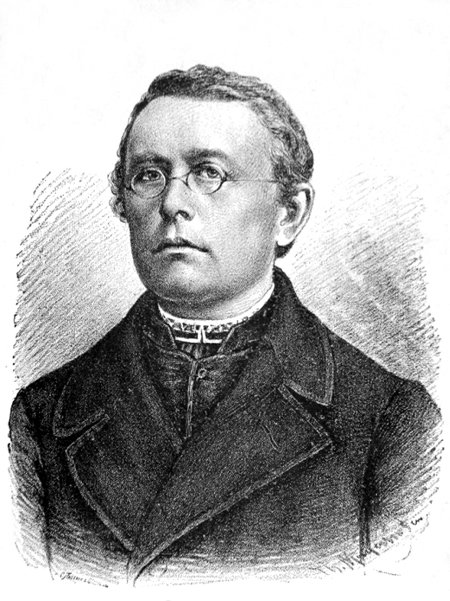 |
| Mykhailo Verbytsky |
Upon arrival to the banks of Bosporus in the beginning of 1929 as a representative of UNR Government-in-exile Volodymyr Mursky immediately reached out to the Orthodox clergy of Istanbul, first and foremost, to the representatives of Ecumenical Patriarch and other Christian communities of the city. Building such bridges would also be helpful in performing his basic, diplomatic function as defined by UNR Government.
One of the first true friends V. Mursky made in Istanbul was Bulgarian Exarch’s deputy - Metropolitan Boris. In the end of 19th century Boris studied at Kyiv Theological Academy and was classmates with one of UNR leaders Oleksander Lototsky, which might have contributed to strengthening relationship.
Friendship with Boris was not limited to mutual greetings on religious fests, or exchanging gifts. They met often and spent some time together.
For instance, on January 23, 1930, V. Mursky, together with the Secretary of the Ukrainian community of Istanbul M. Zabjello, on behalf of O. Lototsky met with Bulgarian Metropolitan Boris for an almost 4-hour conversation. They discussed international affairs in the light of Ukrainian issue, the Ukrainian Church development challenges, and Ukrainian émigrés future in Turkey, Bulgaria and other Balkan states.
Metropolitan pledged his assistance to the Ukrainian émigrés in Bulgaria, and the Ukrainian delegation, in turn, informed Metropolitan Boris on Ukrainian affairs developments and promised to provide relevant literature. The meeting participants agreed on a return visit of Metropolitan Boris.
That visit took place January 27, 1930. Metropolitan, together with his personal secretary Nikolov, visited V. Mursky at his home. At dinner Mursky continued introducing Metropolitan Boris to Ukraine: its history, culture, fine arts, especially ornaments and embroidery, current affairs and future plans of Government-in-exile. Representatives of Ukrainian community handed over to Metropolitan all the necessary information regarding Ukraine.
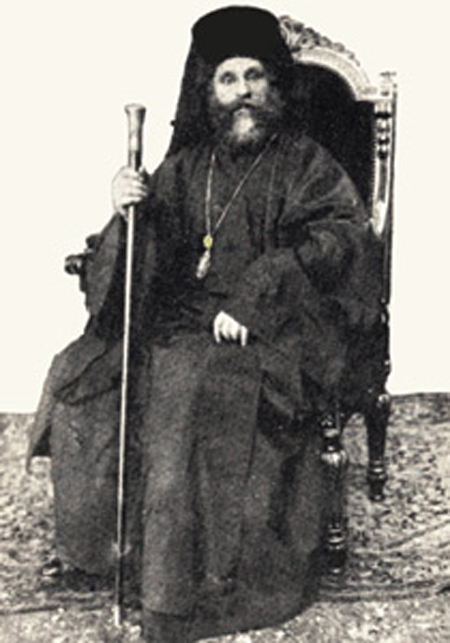 |
| Ecumenical Patriarch Photios II |
On April 19-20, 1930, for Easter Night and Easter V. Mursky and representatives of Ukrainian community in Istanbul on behalf of the UNR President-in-exile presented metropolitan Boris with stylized Ukrainian icons that were sanctified and put at an honorary place at the Bulgarian Metropolitan Church. Upon Easter worship held by Metropolitan Boris V. Mursky was introduced to the stuff of diplomatic corps of Bulgaria in Turkey, the Ambassador, the Consul, and other prominent figures of Bulgarian diaspora.
On May 21, 1930, V. Mursky and M. Zabjello were invited to Bulgarian community Saints Cyril and Methodius Day celebration organized by Metropolitan Boris. Possibly, it was the assistance of Boris, as well as some of the activists of Ukrainian community in Istanbul, that put V. Mursky on fast track to establishing personal connections with some of the members of the Ecumenical Patriarchate, and, later, with Patriarch Photios II. In 1929-1930 V. Mursky was regularly invited to the Divine Liturgy at the Cathedral of Constantinople – Church of St. George in the Phanar district of Istanbul.
 |
|
Church of St. George. Istanbul. Phanar district Photo: Wikipedia |
Ecumenical Patriarch’s good relation to V. Mursky is corroborated, in particular, by the fact that during the meeting with V. Prokopovych Patriarch several times referred to Mursky as "mein Freund" ("my friend" – conversation was in German).
Mursky’s level of involvement and his aptitude for being useful in solving religious issues did not go unnoticed by UNR leadership. That’s why in one of his letters the Vice Premier and the Minister of Internal Affairs of UNR Government-in-exile O. Lototsky noted extreme importance of Mursky’s role in resolving the issues of the Ukrainian Church, in particular, the issue of approval of Ukrainian Orthodox Church in America; calling Mursky the Ukrainian Nuncio in Istanbul.
By the way, O. Lototsky’s high praise of V. Mursky’s activity was far from casual. Lototsky new from personal experience how hard it was to settle religious affairs.
In 1919-1920, when he was UNR Ambassador Extraordinary to Turkey, O. Lototsky conducted negotiations with the Ecumenical Patriarch regarding Tomos on autocephaly of the Ukrainian Orthodox Church.
We can call it the first attempt at gaining Tomos on autocephaly that, unfortunately, resulted in failure. The formal reason for request denial was the absence of an Ecumenical Patriarch on the Throne; the elections of Patriarch were planned for a later date. For more detail see O. Lototsky memoirs "In Tsarigrad" ("V Tsargorodi").
 |
| Oleksandr Lototsky |
Thus, in the beginning of 1930, V. Mursky’s activity created favorable conditions for the start of direct communication between the UNR leadership and the Ecumenical Patriarchate of Constantinople.
V. Mursky was informed on the visit of the Head of the UNR Government to Istanbul in the late May 1930.
The initial plan was that V. Prokopovych would be transiting Istanbul on his way to take part in Inter-Orthodox Commission [also called the Conference, probably, with reference to Pan-Orthodox Conference of 1923 – translator’s note] convened by Ecumenical Patriarch Photios II at the Sacred Monastery of Vatopedi on Mount Athos. The Prime Minister was planning on addressing the Commission regarding the issues of the Church in Ukraine and émigrés; and ask for a Tomos on autocephaly of the Ukrainian Orthodox Church.
In that regard, the UNR Ambassador to Warsaw Roman Smal-Stotsky reached out to V. Mursky with request to provide organizational detail for V. Prokopovych’s visit. The letter, specifically, stated that:
"…3) Mister Prime-Minister entrusts you with preparing the patriarchate (very carefully) and checking for possibility of getting an audience with the Patriarch.
4) Be prepared for a trip to Salonika to the place of the Conference. Will probably have to make a stop at the town of Karyes. Please, collect all the relevant information about the travel route.
5) During the Prime-Minister’s stay, please, act as his secretary and provide him all the needed support in word and in deed…"*.
* from the letter by R. Smal-Stotsky – CZRU FIS File 12617, Vol. 15., P. 264.
V. Prokopovych’s visit to Istanbul was confidential. It was neither revealed in the press, nor had any official meeting been arranged. The decision to keep visit a secret was most likely due to external factors.
The UNR leadership in exile tried to avoid any additional pressure on the Ecumenical Patriarchate, first, on the part of the Russian Orthodox Church, which was at the time already under control of the Soviet State, and, second, on the part of the official Ankara that was traditionally extremely sensitive to any international activity of Phanar.
Thus, the Head of UNR Government-in-exile V. Prokopovych arrived to Istanbul on June 8, 1930, by ferry from Romania accompanied by Prince Giorgi Nakashidze – Georgian immigrant, renowned Promethean activist, and Bishop Seraphim, who, just four months ago, had fled from Bolshevik Kharkiv and settled in Warsaw.
During his visit V. Prokopovych stayed at V. Mursky’s home in the Istanbul district of Yeşilköy, better known under its historic name of San Stefano. The next day V. Prokopovych and V. Mursky met with the representatives of General Consulate of Poland. Due to number of international and domestic political reasons the meeting decided to give up on the idea of going to Greece, and to, instead, concentrate effort on arranging the meeting with Ecumenical Patriarch.
Prime-Minister’s visit to Istanbul lasted till June 15 and was rich in events. He conducted a number of working meetings with activists of the Ukrainian community in Istanbul, the Consul General of Poland in Istanbul, the leader of Crimean-Tatar immigrant community in Turkey Djafer Seidamet, wrote more than 10 letters to UNR leaders in Paris, Warsaw, and Vienna. V. Prokopovych was deeply impressed by the meeting with Bulgarian Metropolitan Boris on June 14. Later, the Head of Government-in-exile spoke extremely high of this meeting. In his letters to Andriy Livytsky, Oleksandr Lototsky and Oleksandr Shulgin, V. Prokopovych wrote:
"…I was deeply impressed with humility, compassion to us and sympathy to our cause of the local Metropolitan of Bulgaria. He is our great friend and an exceptional host…"; "... Bulgarian Metropolitan simply enchanted me with his humility and sympathy to our cause: we had a long substantive conversation…"; "…Had good impression of the meeting with the local Bulgarian Metropolitan. He is our fiend and can help with our work in Bulgaria…"
However, it was the meeting of V. Prokopovych with Ecumenical Patriarch that became the highlight of the visit. The meeting was held June 12, 1930. Apart from V. Prokopovych and Photios II at the meeting were also present V. Mursky and the Secretary of Ukrainian community in Istanbul M. Zabjello.
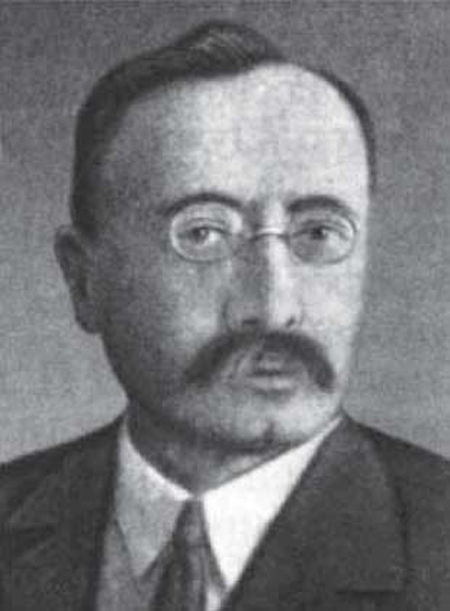 |
| Vyacheslav Prokopovych |
According to the participants’ testimony, the setting of the meeting was friendly. Upon lengthy discussion of issues of the Ukrainian Church and émigrés, and general situation in Ukraine, the Prime Minister of UNR handed Ecumenical Patriarch document confirming his mandate as the representative of the Highest Council of Ukrainian Émigrés, as well as the Memorandum by his personal signature. The text of this document is rather small, so we present it in full:
"Istanbul. June 12, 1930
To His All-Holiness Photios II, Ecumenical Patriarch in Constantinople
Your All-Holiness,
As the delegate of the Supreme Council of Ukrainian Émigrés I have the honor of bring the following facts to your attention:
1. The current position of the Orthodox population of Ukraine does not meet their religious needs and does not allow them to appropriately arrange their spiritual life, or freely express their will.
The Ukrainian émigrés, who now stay outside of their homeland, consider it their duty to ask Your All-Holiness not to turn away from religious life of Ukraine. This life should flourish upon restoration of our State’s independence and revival of spiritual relationship with the Ecumenical Patriarchate in accordance with historical tradition, and, in accordance the will of the nation, the Autocephalous Church must be established in the independent state.
2. Religious feelings and religious needs have special meaning to Ukrainian émigrés. Separated from their motherland and disseminated throughout the world, Ukrainians form multiple congregations that consist of thousands of believers.
The Ukrainian Émigrés, traditionally faithful to the Holy Orthodox Church, would be extremely happy to find protection with Ecumenical Patriarch under whose jurisdiction their spiritual life would flourish and their religious needs would be met.
Thereby, the Supreme Council of Ukrainian Émigrés takes it upon itself to ask your All-Holiness not to refuse taking under your guidance the Ukrainian believers, residing in the Western and Central Europe, and from this moment on considering them your flock.
Delegate of the Supreme Council of Ukrainian Émigrés
Vyacheslav Prokopovych"
 |
|
Copy of Memorandum, submitted by V. Prokopovych to Ecumenical Patriarch Photios II
|
 |
|
Copy of Memorandum, submitted by V. Prokopovych to Ecumenical Patriarch Photios II
|
Thus, in his Memorandum the UNR Prime Minister requested Ecumenical Patriarch’ s assistance in establishment – upon restoration of the independent state of Ukraine – of the Ukrainian Autocephalous Church, and asked Ecumenical Patriarchate to assume jurisdiction over the Orthodox Ukrainian émigrés.
According to accounts of the meeting participants, including V. Prokopovych, Ecumenical Patriarch gave positive answer to both clauses of the Memorandum. He blessed the Ukrainian émigrés and promised to provide all kind of assistance in solving the Ukrainian Church issue, in particular, with the Holy Synod.
Upon the meeting V. Prokopovych thanked V. Mursky for organizing the audience, and wrote several optimistic letters to other UNR leaders.
Also, with V. Mursky’s assistance, on June 13 there was a meeting between Photios II and Bishop Seraphim, who arrived to Istanbul with V. Prokopovych. According to the Prime Minister, this conversation was a follow-up meeting.
On June 15, 1930, V. Prokopovych left Istanbul for Sofia. At the train station he was escorted by V. Mursky, Ukrainian community activists, D. Seidamet, Consul General of Poland.
The meeting with the Ecumenical Patriarch made a tremendous impression on the UNR leaders. During Vyacheslav Prokopovych’s stay in Istanbul Volodymyr Mursky received instructions to prepare for the arrival of the Head of UNR-in-exile Directory Andriy Livytsky and the UNR Military Minister Volodymyr Salsky, whose visit to Istanbul was planned for the end of July 1930.
However, that visit had not taken place, probably, due to inter-Government conflict between supporters of A. Livytsky and V. Salsky.
It is also worth mentioning that V. Mursky organized audience with Photios II for Prince G. Nakashidze. Russian imperial pressure resulted in loss of the Church autonomy by Georgia as well. So, Nakashidze in his audience with Ecumenical Patriarch also raised issue of autocephaly of the Georgian Orthodox Church.
The UNR Government representative in Istanbul V. Mursky remained in contact with Ecumenical Patriarch after Prokopovych’s visit to Istanbul was over, and the Prime Minister returned to Warsaw. On January 1, 1931, V. Mursky, together with M. Zabjello, attended the Holy Worship at the Patriarchate’s Cathedral and Ecumenical Patriarch’s reception at the Ceremonial Hall of the Patriarchate. They received Patriarch’s blessing and had conversation with him and his personal secretary Papa-Ioannu.
Ecumenical Patriarch was very welcoming of the representatives of Ukrainian community in Istanbul. V. Mursky presented His All-Holiness with the copy of his recently published book "Ukraine and its struggle for independence". Members of Patriarchate were deeply impressed by the appeal they had received from the Ukrainian congregation of America (more than 400 thousand persons) on taking the Ukrainian Orthodox Church of America under direct jurisdiction of Ecumenical Patriarch. Papa-Ioannu assured V. Mursky that the issue of autocephaly will be discussed at the nearest Ecumenical Council that was planned for the beginning of 1932.
V. Mursky kept raising the issue of autocephaly of the Ukrainian Church in America with the Patriarchate. Issues of internal strife among American Orthodox clergy was discussed with Patriarch’s secretary Papa-Ioannu July 10 and August 13, 1931. Based on these discussions, V. Mursky submitted special memorandum. Papa-Ioannu promised to personally pass the document and content of their conversations on to Ecumenical Patriarch.
UNR Government-in-exile’s pursuit of autocephaly of the Ukrainian Orthodox Church might have been a much greater success had it not been for untimely death of Photios II and V. Mursky, who died almost simultaneously in 1935.
Thus, the issue of receiving the Tomos of autocephaly and establishment of the Autocephalous
Orthodox Church in Ukraine is not a question of the present. It is rooted in the past, when the Moscow Patriarchate denied Ukrainian Church its autonomy.
Each time the imperial pressure on Ukraine got eased or formation of an independent Ukrainian state got initiated, one of the immediately raised questions was the autocephaly of the Church. In times of Ukrainian revolution, when Ukraine was an independent state, the issue had not been resolved. However, even upon failure of attempts at a state independence, the UNR Government-in-exile kept struggling to resolve the autocephaly issue.
And this struggle, in which V. Mursky played an important role, was not in vain, as it provided certain expertise proven helpful in resolving modern-day issues of the Ukrainian Orthodox Church.
